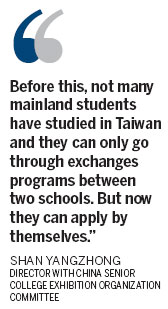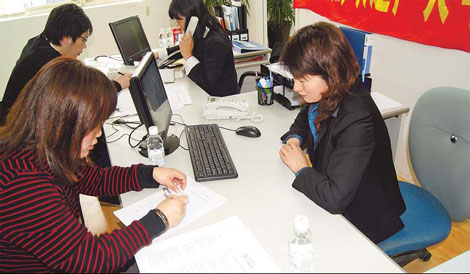Life
Taiwan opens door to mainland students
By Wang Wei (China Daily)
Updated: 2010-05-25 08:05
 |
Large Medium Small |
|
Yan Dong shows an application form for mainland students wanting to study in Taiwan universities during a consultation event. Photos Provided to China Daily |
This educational initiative will bridge the gap between the two sides, says director with China Senior College Exhibition Organization Committee.
Meng Fan, 19, learned about Taiwan in textbooks when she was in primary school. Since then, she has longed to go there.
"It was called 'treasure island ' in the textbook," the freshman from China Institute of Industrial Relations in Beijing said.
"It has many beautiful scenic spots like Sun Moon Lake and Mount Ali. I really wanted to go there."
Now, she can realize her dream because 73 private universities and vocational institutions in Taiwan will, for the first time, enroll students from the mainland.
About 1,000 students, including 20 from Beijing, have applied. All applicants will have to be studying in universities or vocational colleges in the Chinese mainland. Universities in Taiwan plan to recruit 2,000 mainland students, according to said Shan Yangzhong, director with China Senior College Exhibition Organization Committee, which acts for institutions on both sides of the Taiwan Straits.
Successful students will head for Taiwan in September, Shan said. Tuition fees are NT$2,250 (about $70) per credit.
On average, 18 credits are needed to complete a six-month semester. Living expenses are about NT$20,000 for six months.
Once a student has been admitted by a Taiwan institution, an agreement will be signed by the two institutions. Students will receive degrees from both.
"Before this, not many mainland students have studied in Taiwan and they can only go through exchanges programs between two schools," he said. "But now they can apply by themselves.
"I hope our program can build a bridge between the youth from the two sides."

Geographically speaking, the breadth of Taiwan Straits is the distance between Chinese mainland and Taiwan, but in reality, the gap between the two sides is filled with misunderstandings and misconceptions.
Jia Jia, a Fudan University student, posted his experiences in a blog as an exchange student at Tamkang University in Taipei.
"They were surprised when they saw me using a Nokia mobile phone and asked whether Nokia had presence on mainland," he said.
When they heard another student was from Inner Mongolia, they asked what the feeling is living in a yurt, Jia's blog said.
However, he said he likes Tamkang's teaching methods, using many part-time teachers who are veterans in their fields. They pass on many practical experiences, which can hardly be learned from textbooks.
"Every class has a maximum of 30 students. I can learn better in a smaller class," Jia said.
Shan believed going to Taiwan to study is a great opportunity for mainland students.
He said Taiwan universities were traditionally good at majors such as medical care, agriculture and telecommunications, and students can get up-to-date information.
In addition, it is not too difficult to get accustomed to the life in Taiwan since its first language is Chinese and the both sides share similar cultural traditions, he said.
Furthermore, it will significantly increase employment prospects by a Taiwan company in the mainland.
Students are eligible to apply when their institution gives them a high political awareness certificate, Shan said.
Taiwan government will only grants a six-month visa to mainland. Those intending to continue for another semester will need to return to mainland and reapply.
"If everything goes well, we will deepen the cooperation between the universities from both sides," Shan said. "We plan to open Taiwan's 50 public universities to mainland students in next March."
Applications, which started on April 1, will be closed at the end of this month.
|
Students fill out application forms for studying in Taiwan. |

